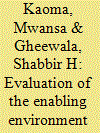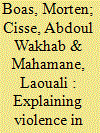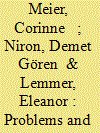|
|
|
Sort Order |
|
|
|
Items / Page
|
|
|
|
|
|
|
| Srl | Item |
| 1 |
ID:
109129


|
|
|
|
|
| Publication |
2011.
|
| Summary/Abstract |
The aim of this article is to analyze critically the implications of Malawi's changing nature of politics on civil society organizations (CSOs). The article seeks to clarify whether or not the social, political and economic engagement of civil society organizations has contributed to a strengthened relationship between Malawi' government and its own development agenda, given the CSOs' dependence on 'Northern' aid agencies and/or international NGOs. The article argues that while the change from dictatorial regimes to a multiparty political system has enhanced civil society participation in Malawi's social, economic and political issues, the CSO-government relationship is still fraught with suspicion and mistrust.
|
|
|
|
|
|
|
|
|
|
|
|
|
|
|
|
| 2 |
ID:
180102


|
|
|
|
|
| Summary/Abstract |
The low adoption rates of modern bioenergy systems in the rural areas of Zambia indicate shortcomings within the existing institutional arrangements for a conducive enabling environment for their deployment. To address them, this study employed the SWOT–AHP (Strengths, Weaknesses, Opportunities, Threats-Analytic Hierarchy Process)-TOWS (Threats, Opportunities, Weaknesses, Strengths) technique to assess the effectiveness of such arrangements by building on the insight of the identified stakeholders. This led to the generation of ideas for further policy development for rural-based bioenergy systems. The SWOT-AHP analysis shows that the negative aspects (weaknesses and threats) associated with the enabling environment for the promotion of rural-based bioenergy systems dominate their positive counterparts (strengths and opportunities). Among others, the following policy considerations are vital to the enhancement of the enabling environment in this context: (1) building relevant policy actors' analytical capacity in biomass supply chains for cooking and heating fuels, (2) seeking developed-country support for the effective transfer of bioelectricity technologies, and (3) developing a framework used in planning for the sustainability of rural-based bioenergy systems. To increase the likelihood of their adoption, these strategies must be aligned with the country's higher-level national development goals.
|
|
|
|
|
|
|
|
|
|
|
|
|
|
|
|
| 3 |
ID:
178528


|
|
|
|
|
| Summary/Abstract |
The Tillabéri region in Niger has quickly lapsed into a state of violence and come under the control of ‘violent entrepreneurs’ – that is, non-state armed actors possessing some kind of political agenda, which is implemented in tandem with different types of income-generating activities. Violent entrepreneurs rule by force and violence, but they also distribute resources, provide some level of order and offer protection to (at least parts of) the population in the areas they control, or attempt to control. In many local communities in peripheral areas of the Sahel, these violent entrepreneurs have a stronger presence than international community actors and their national allies. This situation is partly the result of spill-over effects from the war in Mali and local herder-farmer conflicts, but the key factors are the ability of jihadi insurgents to appropriate local grievances and the failure of the state to resist this.
|
|
|
|
|
|
|
|
|
|
|
|
|
|
|
|
| 4 |
ID:
153101


|
|
|
|
|
| Summary/Abstract |
The benefits of early childhood development (ECD) programmes are strongly supported by evidence of reduced school dropout and repetition rates. However, the literature on ECD is primarily grounded in research based in the United States (US); in the light of this gap in the literature, this paper provides a comparative overview of ECD policy and practice from outside of the US, namely in South Africa and Turkey. As a theoretical framework the paper has followed the World Bank’s Systems Approach for Better Education Results (SABER)-ECD Analytical Framework. Findings indicate that both countries have established an enabling policy environment for ECD but implementation and the setting of and compliance to standards for quality is still emerging, in spite of massive strides made in this field during the past fifteen years.
|
|
|
|
|
|
|
|
|
|
|
|
|
|
|
|
|
|
|
|
|